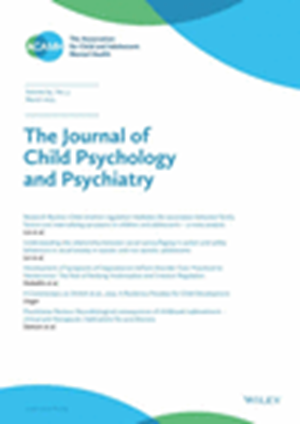编辑视角:评估ADHD父母干预的挑战——走向混合方法。
IF 7
1区 医学
Q1 PSYCHIATRY
引用次数: 0
摘要
行为父母训练(BPT)已被推荐作为儿童注意力缺陷/多动障碍(ADHD)多模式干预策略的一部分。然而,对其有效性的评估是具有挑战性的,因为荟萃分析表明,在最近端(MPROX)和可能盲法(PBLIND)结果测量之间存在差异。从编辑的角度来看,我们提供了五个假设来解释这种差异。前三个假设假设MPROX- pblind的差异表明BPT并没有减少实际的ADHD特征,MPROX正在挑选一个假阳性。最后两个重点是在荟萃分析中报告的PBLIND评估的局限性,以及它们给出假阴性的假设。我们的结论是,在多方法评估方法中整合父母评级和观察措施的混合方法可能提供前进的道路。总之,我们认为,对于父母和临床医生来说,父母对ADHD特征的评分以及其他父母或孩子对结果的评分,如心理健康、生活质量和总体幸福感,比“客观”的症状改变更重要,这鼓励我们将注意力从控制症状转移到促进整体功能和幸福感上。本文章由计算机程序翻译,如有差异,请以英文原文为准。
Editorial Perspective: The challenge of evaluating ADHD parenting interventions - towards a hybrid approach.
Behavioural parent training (BPT) has been recommended as part of multi-modal intervention strategies for children with attention-deficit/hyperactivity disorder (ADHD). The evaluation of its effectiveness, however, is challenging, as meta-analyses have indicated a discrepancy between effects on most proximal (MPROX) and probably blinded (PBLIND) outcome measures. In this editorial perspective, we provide five hypotheses that may explain this discrepancy. The first three hypotheses assume that the MPROX-PBLIND discrepancy demonstrates that BPT does not reduce actual ADHD characteristics and that MPROX is picking up a false positive. The final two focus on the limitations of the PBLIND assessments reported in the meta-analyses and the assumption that they are giving false negatives. We conclude that a hybrid approach, integrating parent ratings and observational measures within a multimethod assessment approach, may provide a path forward. In conclusion, we argue that for parents and clinicians, parent ratings of ADHD characteristics and other parent- or child-rated outcomes, such as mental health, quality of life and general well-being, are more important than 'objective' symptom change, which encourages us to shift the focus from the control of symptoms to the promotion of general functioning and well-being.
求助全文
通过发布文献求助,成功后即可免费获取论文全文。
去求助
来源期刊
CiteScore
13.80
自引率
5.30%
发文量
169
审稿时长
1 months
期刊介绍:
The Journal of Child Psychology and Psychiatry (JCPP) is a highly regarded international publication that focuses on the fields of child and adolescent psychology and psychiatry. It is recognized for publishing top-tier, clinically relevant research across various disciplines related to these areas. JCPP has a broad global readership and covers a diverse range of topics, including:
Epidemiology: Studies on the prevalence and distribution of mental health issues in children and adolescents.
Diagnosis: Research on the identification and classification of childhood disorders.
Treatments: Psychotherapeutic and psychopharmacological interventions for child and adolescent mental health.
Behavior and Cognition: Studies on the behavioral and cognitive aspects of childhood disorders.
Neuroscience and Neurobiology: Research on the neural and biological underpinnings of child mental health.
Genetics: Genetic factors contributing to the development of childhood disorders.
JCPP serves as a platform for integrating empirical research, clinical studies, and high-quality reviews from diverse perspectives, theoretical viewpoints, and disciplines. This interdisciplinary approach is a key feature of the journal, as it fosters a comprehensive understanding of child and adolescent mental health.
The Journal of Child Psychology and Psychiatry is published 12 times a year and is affiliated with the Association for Child and Adolescent Mental Health (ACAMH), which supports the journal's mission to advance knowledge and practice in the field of child and adolescent mental health.

 求助内容:
求助内容: 应助结果提醒方式:
应助结果提醒方式:


